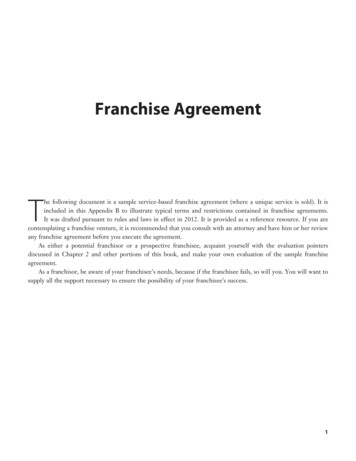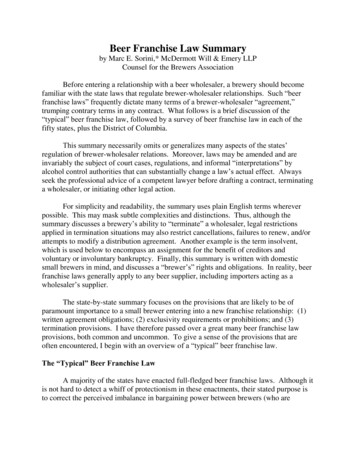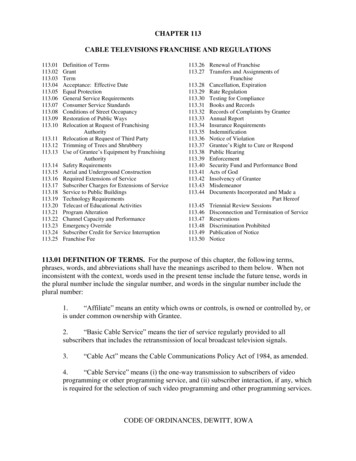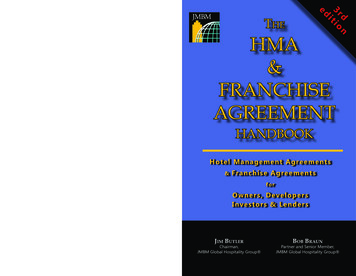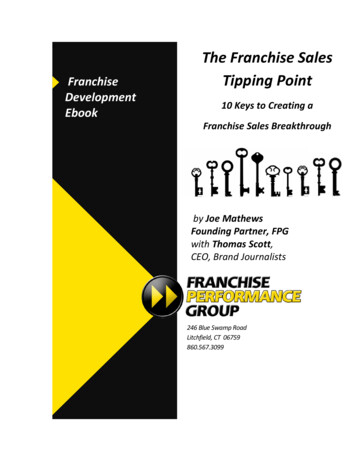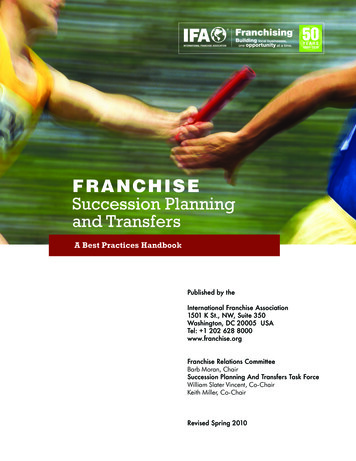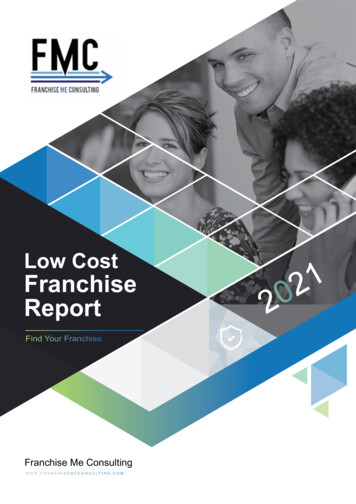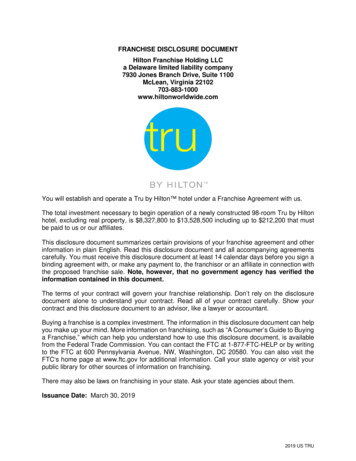
Transcription
Presenting a live 90-minute webinar with interactive Q&ANegotiating Cable Franchise Agreementsand Renewals: Guidance forMunicipal AttorneysWEDNESDAY, JANUARY 24, 20181pm Eastern 12pm Central 11am Mountain 10am PacificToday’s faculty features:Michael Bradley, Partner, Bradley Berkland Hagen & Herbst, Woodbury, Minn.Daniel S. Cohen, Founder, Cohen Law Group, PittsburghBrian T. Grogan, Atty, Moss & Barnett, MinneapolisThe audio portion of the conference may be accessed via the telephone or by using your computer'sspeakers. Please refer to the instructions emailed to registrants for additional information. If youhave any questions, please contact Customer Service at 1-800-926-7926 ext. 1.
Tips for Optimal QualityFOR LIVE EVENT ONLYSound QualityIf you are listening via your computer speakers, please note that the qualityof your sound will vary depending on the speed and quality of your internetconnection.If the sound quality is not satisfactory, you may listen via the phone: dial1-866-871-8924 and enter your PIN when prompted. Otherwise, pleasesend us a chat or e-mail sound@straffordpub.com immediately so we can addressthe problem.If you dialed in and have any difficulties during the call, press *0 for assistance.Viewing QualityTo maximize your screen, press the F11 key on your keyboard. To exit full screen,press the F11 key again.
Continuing Education CreditsFOR LIVE EVENT ONLYIn order for us to process your continuing education credit, you must confirm yourparticipation in this webinar by completing and submitting the AttendanceAffirmation/Evaluation after the webinar.A link to the Attendance Affirmation/Evaluation will be in the thank you emailthat you will receive immediately following the program.For additional information about continuing education, call us at 1-800-926-7926ext. 2.
Program MaterialsFOR LIVE EVENT ONLYIf you have not printed the conference materials for this program, pleasecomplete the following steps: Click on the symbol next to “Conference Materials” in the middle of the lefthand column on your screen. Click on the tab labeled “Handouts” that appears, and there you will see aPDF of the slides for today's program. Double click on the PDF and a separate page will open. Print the slides by clicking on the printer icon.
5
6
7
8
9
10
11
12
13
14
15
16
17
18
19
20
21
22
23
24
25
26
Negotiating Cable FranchiseAgreements: Guidance forMunicipal AttorneysStrafford CLE WebinarJanuary 24, 2018
Presenter:Dan CohenAttorney, Cohen Law Groupdcohen@cohenlawgroup.org(412) 447-0130 x11
29
Negotiating Cable Franchise AgreementsMore Challenging and Uncertain Environment 10-15 years ago, cable companies were virtualmonopolies in the video market. Today, incumbent cable companies have greatercompetition Wired competitive operators (telephone companies) Satellite dish (DBS) operators (Dish, Direct TV) Video streaming Major changes in the industry with the increase incable “cord cutters” and the proliferation of “over thetop” (OTT) video streaming services.30
Negotiating Cable Franchise AgreementsMore Challenging and Uncertain Environment Questions about the future classification of thesenew video services; Industry consolidation has made cable operatorsmore “corporate” and less local; Statewide franchising has reduced local benefitsand have eviscerated local franchise rights; Yet, within this climate of uncertainty, there aresome fixed truths:31
In the states thatstill have localfranchising, localgovernments stillcontrol the publicrights-of-way withrespect to cableservices.32
These localgovernments havesignificant powerand strongenforcementauthority over cableoperators.33
Negotiating Cable Franchise AgreementsGuiding Principle In the 25 states with local franchising, localofficials are effectively the “landlords” of theirpublic rights-of-way Local governments are entitled under federal lawto a fair return on the cable operator’s use ofmunicipal property Franchise renewal is the best opportunity to assertyour rights and obtain benefits from your cablecompany(ies)34
Key Points to Negotiate1. Increased Franchise Fees 5% of “gross revenues” from cable services. Goal:5% of a large pie rather than 5% of a small pie. Re-define “gross revenues” in agreement: Currently 27 separate revenue sources comprising“gross revenues.” Revenue list expands as operatorscharge new fees.Subscriber based v. non-subscriber based revenuesNew revenue sources since your last renewal (ex.broadcast retransmission fee, regional sports fee) Impact of “cord-cutting” and “cord-shaving”35
Key Points to Negotiate2. Greater Franchise Fee Accountability Strong franchise fee audit provisions with long“lookback” (limitations) period 36Has the cable operator paid on all revenue sourcesincluded in “gross revenues”?Has the cable operator allocated bundled servicerevenue sources correctly to cable service?Has the cable operator coded all residential addresses tothe correct jurisdiction? Homes passed list review.Most likely, the cable operator has underpaid, whichusually means retroactive and prospective payments.
Key Points to Negotiate3. Service to Unserved Areas Density (number of homes per mile needed to extendcable system) is a negotiable issue Cable operator won’t provide their return on investment(ROI) formula.Instead, identify unserved areas and demand actual costs(time and materials) for serving them. Line extension formula 37For areas that don’t satisfy density threshold, negotiate costsharing formulaExample: Subscriber pays % of costs % of homes belowthe density number.
Key Points to Negotiate4. PEG Channel EnhancementsHigh definition (HD) format is top priority foractive PEG channels. Typically easier withcompetitive than incumbent operators (bewarecompetitive equity). Bandwidth argument fornegotiations. Also, new return lines and relocations at nocharge, commercial technical quality, video-ondemand (VOD) platform, electronicprogramming menu, rebranding funds forchannel relocations. 38
Key Points to Negotiate5. PEG Financial Support Cable operator must meet your cable-related needstaking into account cost of meeting those needs. Don’t allow cable operator to control grant discussion.Demand item-by-item response to your equipmentand studio upgrade list. Cost is a factor, but not determinative as they’re passedthrough as separate line item on subscribers’ bills. Between incumbents and competitors, must be a “raceto the top, not to the bottom.”39
Key Points to Negotiate6. I-Net Preservation/Expansion Cable operators no longer build new I-Nets. Must preserve 40current I-Nets as critical infrastructure for public safety, etc.Investigate whether local subscribers paid for original I-Net.More negotiating leverage.Most likely portions of I-Net that municipal-owned fiberand connections that occurred over time.Montgomery County v. FCC (6th Cir. 2017): Court held thatthe FCC’s “mixed use ruling” does not mean that localgovernments can’t regulate I-Nets.Important to secure indefeasible right of use (IRU) for INet. Can extend beyond expiration of franchise term.
Key Point to Negotiate7. Competitive Equity Beware this seemingly benign “poison pill.” Underminescompetition and your negotiating leverage for benefits. Nothing in federal law requires competitive equity provision. Even in so-called “competitive equity states,” franchiseagreements typically need only to be “roughly equivalent.” If cable operator presses comparison of current negotiationwith a franchise agreement negotiated years ago, then there’sno “equity” for the local government. Provision must be based on totality of the agreement andequity decisions must be controlled by the local government.41
42
43
Negotiating Cable FranchiseAgreements and Renewals:Guidance for Municipal AttorneysStrafford WebinarJanuary 24, 2018Presented by: Brian T. Grogan, Esq44
Congress and FCC 2018 Communications Act rewrite? Impact of FCC 621 Orders Other FCC action in 2018? BDAC model ordinance proposalBDAC recommendations to reduceregulations45
Grant of Authority What does your new cable franchise authorizethe operator to do in your ROW?Did you grant authority solely for cable services? Focus on authority being requested Title VI of the Cable ActWas the grant broad to include any service the operatorchooses to provide?Broadband, telecommunications, wirelessDo not waive right to regulate other services operator mayseek to provide beyond cable servicesCode provisions - often not updated No longer just utilities using ROWDifferent ROW rules for different users Gas, electric, water, telecom, cable, wireless46
Termination for Convenience Grantee seeks right to terminate franchise At any time, for any reasonFor the convenience of the GranteeCity has limited franchise termination rights Subject to applicable lawMeans city can’t terminate unless Could result in immediate cessation of all feepayments Material breachOpportunity to cureLengthy and costly proceedingsHow would city budgetNo PEG channels, no fee payments, no contract Left only with ROW ordinance47
Complimentary Cable Services Cable Act (622(g)(2)(D)) exempt from franchisefees Bonds Security funds Letters of credit Insurance Indemnification Penalties Liquidated damagesFCC 621 Order – “requirements or charges incidental to the awarding orenforcing of the franchise,” including payments for:Jan 20155% franchise fee cap applies to in-kind paymentsInvolving both cable and non-cable servicesFree or discounted cable services To schools or public buildingsOperators rely on FCC 621 order to argue Such in-kind services are subject to 5% cap48
PEG HD Channels Can cities mandate high definition (HD)? Nothing in federal law prohibits such a requirement State laws may vary Operator shall carry the PEG program stream and all programrelated material without interruption, deletion, downconversion to a lower resolution format, or materialdegradation from the signal quality received by the operatorand with a technical quality equal to or better than all othersimilarly-formatted commercial digital signals carried on theSystem. In transmitting the PEG channel(s) the operator shall complywith the Advanced Television Systems Committee (“ATSC”)standard A/65 Program and System Information Protocol(“PSIP”), or any successors thereto.49
PEG Channel Location Can you specify in the in franchise?Nothing in federal law prohibits such arequirement State laws may vary: The PEG channel(s) shall be carried on the basic tier ofservice that is available to and viewable by all subscribersof the system. Operator shall carry PEG channel(s) on position that iscontiguous with and in the same channel neighborhoodthat includes similarly formatted programming feeds of alltelevision stations located in the “DMA” that are affiliatedwith a “big 4 network” carried on the system50
PEG Fiber Returns Can cities mandate upstream fiber returns? To obtain local programming from public buildingsTo transmit PEG programing from playback site tooperator head endHow paid for?Is this deductible from franchise fee?Is this considered a PEG capital fee?What about recurring fees for transmissionImpact of FCC 621 order Is this an in-kind payment?What about existing facilities that have long since beeninstalled and paid for?51
Bundling – Are You Losing Subscriber selects triple-play Subscriber incurs late fee Cable, telephone and broadbandWhat portion of late fee is included in franchise feecalculation?Should the late fee be split three ways?Allocated based on revenue attributed to each service?Answer depends on franchise language Definition of gross revenues, related franchise provisionsBe careful about GAAP references in defined termsBe very cautious when drafting new franchise revenuetermsSignificant revenue at stake52
PEG Fee Calculations Percentage of “Gross Revenues” Calculated the same as franchise feeEasiest to administer for local governmentMany state statutes use this approachResolves CPI adjustment issuePEG fee – charged per subscriber How applied to bulk MDUs?“Equivalent billing unit”Divide the total monthly bulk rate the MDU is charged forbasic tier of service, by the standard monthly basic tierretail rate charged to a non-bulk billed subscriber in thecity, however, in no event will the number of subscriberscalculated for any such MDU be less than 90% of the actualnumber of dwelling units receiving basic service in the MDU.53
QuestionsBrian T. Grogan, Esq.Moss & Barnett, A Professional Association150 South Fifth Street, Suite 1200Minneapolis, MN 55402(612) 877-5340 phone / (612) 877-5031 facsimileE-mail: Brian.Grogan@lawmoss.comWeb site: www.lawmoss.com54
Negotiating Cable Franchise Agreements More Challenging and Uncertain Environment 10-15 years ago, cable companies were virtual monopolies in the video market. Today, incumbent cable companies have greater competition Wired competitive operators (telephone companies) Satellite dish (DBS) operators (Dish, Direct TV) Video streaming .

